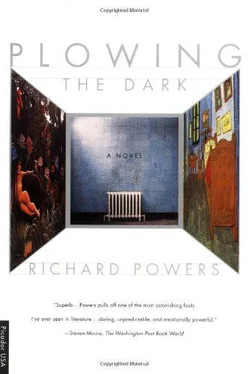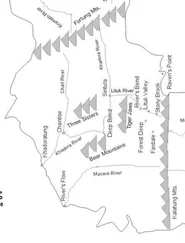Hey, Jackdaw said. Sue Loque. What's a software type doing down among the nuts and bolts?
The woman's ambiguous splay of signals — biker leather trimmed with ratty lace — would have intimidated Adie, even back in blase New York. Out here, in this flood of new rules, they left her feeling shamefully normative.
Sue Loque threw up her hands, the icon for distress. If the hardware types would keep these things tweaked, we software types wouldn't have to get our hands dirty. Why do you think I went into coding in the first place? So that I wouldn't have to touch any printed circuits. What's the problem? Adie asked. They're ugly and septic. No, I mean with the machines.
Oh. Well, they're none too pretty either. And they just stopped polling. Jackdaw shook his head. What do you mean, they stopped polling? I mean they stopped polling.
Whatever it meant, Adie stopped polling, too. Or at least she stopped existing for the two professionals, who set out to backtrace their way into the heart of logic's arctic crystal. The Loque woman and Jackdaw called in Spider Lim, and all three of them disappeared into the
printed-circuit thicket.
Adie glanced around the room. Its likeness had never once been painted. It glowed, an eerie, mechanical hatchery, replete with all the secret trip levers of an ingenious Max Ernst frottage. But all this complexity felt stunningly sterile: as still and smooth and sinister as a turquoise Hockney swimming pool.
Shame and amazement did a two-step inside her. This room was this present's wildest accomplishment, its printing press, its carrack and caravel, its haywain, hanging gardens, and basilica. These demure, humming boxes contained the densest working out, the highest tide of everything that collective ingenuity had yet learned how to pull off. It housed the race's deepest taboo dream, the thing humanity was trying to turn itself into. Yet for all that Adie had seen, art had fled headlong from it, in full retreat, toward some safe aesthetic den of denial, where it could lick its wounds in defeat.
She tried to picture the Arcadian landscapes hiding inside these boxes. But she could form no clearer picture than streams of signals, waves and troughs rushing down narrow silicon sluices, each one setting off another massive cascade of signals. Somehow these signals all lined up, countless dots in a cosmic halftone process, the hammers of a trillion player pianos, the programmed nubs on the drum of a galaxy-sized music box. The voltages performed their megabit marching-band ballets, lining up to stand for anything in creation: a bank balance, an airline ticket, a photo, a song, a letter from a friend, all fully portable, all convertible, one into the other.
Several clock cycles later, hardware and software emerged triumphant, the offending bug squashed between them. Got it? Adie polled them.
We always get it, eventually, Lim said. And he disappeared into the next time-share emergency.
Who was that masked man? Sue asked.
Jackdaw grinned at some safe face in the air between the two women. Sorry for the interruption. Here they are, anyway. The brains behind the operation.
The Cavern's cavern, Sue added.
You mean, all the pictures come from… here? You're trying to tell me that the entire Crayon World is inside these five machines, somewhere? Sue snorted.
Don't snort at me, Adie warned.
Sue traced a wave in the air, half apologetic, half dismissive. She squeezed Adie's shoulder, a reassurance that came off like somebody pumping Windex onto a bathroom mirror. Adie fought the urge to punch this woman, for if it came to blows, this woman could pummel her and Jackdaw put together.
They're all in there, sweetie. Every picture in existence. Every last image ever imagined or imaginable. We just have to figure out how to get them out.
What are they called? These machines?
Jackdaw saw his chance. They're all proprietary TeraSys graphics boxes, of course. They start out life as 3-D accelerated Power Agate servers, running one reality engine for each—
I mean, what are their names?
Their… names?
Adie shook her head: all the commonsense groundwork left undone.
OK, how's about we call this one Da Vinci? He was pretty technological, huh? Inventing submarines, writing backwards, and all that. This one can be Claude. After all, we're going to be cranking out landscape by the gross hectare. Then here's Hsieh Ho, giver of the Six Principles…
Jackdaw cleared his throat. Is that anything like the six degrees of freedom?
And we'll need a Rembrandt. For a lifetime devoted to the play of light against dark. And the last one ought to be Picasso, because—
Because he fucked everything that moved for the better part of a century? Sue suggested.
Jackdaw jerked at the profanity. He lurched for the door, and safety. Uh, maybe we'd better vacate. Gotta get back to that Z-order filter…
Sue fell in behind him. Let's just hope that Rembrandt here doesn't
decide to wig out again before the recompile, tomorrow.
You see? Adie said. It’s useful to know their names, isn't it?
Sue made her noise again, the one Adie warned her not to. Deeper in her sinuses, this time. I love you art school chicks. I really do. You give the whole female race a little — how to say? — éclat.
They might join forces, this female race. A woman who knew how to extract any one of imagination's images from these boxes. And another who knew just which images to extract.
Sue, Adie petitioned her fuchsia-haired colleague. Can you show me how to make these suckers draw?
Adie Klarpol and Sue Loque stood shoulder to shoulder, facing the front wall of the Cavern. Each sported a pair of those ridiculous shuttered glasses. A loud sprig of rhinestones studded the corners of Adie's, a giddy display brought on by the usual overexertion. Sue wore the head-tracking glasses, the ones with the cable conduit that recorded exactly what her eyes were doing at all times.
On the front wall, a wreath of laurel materialized out of an expanse of bridal white. It hung there, blowing in an invisible breeze. On the left wall, menus cascaded out of one another. The other cave walls darkened to a contrasting black, the soot of countless digital campfires. The wreath in front of them had grown from a seed in Adie Klar-pol's mental window box. The Crayon World had thawed the sap of images inside her. It left her needing to see a new bud germinate from scratch. To that end, she and her design colleagues had assembled for a series of tutorials, to learn the ways that virtual leaves might be made.
Grow me a rubber tree, she'd asked Spiegel. Give me a philodendron tendril. She had in mind a surface as rich and convoluted as the solar surf that shaped it. But anything more than a jagged crayon smear would have satisfied her.
Here, she told her fallen poet Stevie. Something like these. And she held out to the softwarewolf a picture in a book.
The color plate she held out was a supremely clumsy representation. Leaves everywhere: a veritable jungle of them. But no leaf that grew on any tree in any country Spiegel or Adie had ever lived in. A rash of stems, fruits, and flowers — all native to the republic of invention. And among the blooms, a naked white woman sprawled upon a jungle-violating sofa, listening to the tune of an ebony flute player from deep in the undergrowth.
Spiegel stared at this hemophiliac sunbather — lenticular, wrong— in a trance of memory. At last he looked away, breaking the picture's spell. He glanced up at his circle of apprentices and said, as if no one were naked: We can make a leaf in several different ways. The simplest of all is to use basic trig.
Читать дальше












